新概念欢乐诵-L26ObjectClause宾语从句
object clause宾语从句
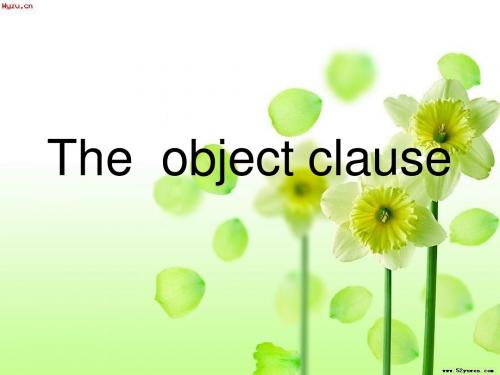
Find mistakes ___ look after the baby. 1.He said he can could ___ her mother. 2.She said she loves loved 3.He says he___ is back soon. will be 4.He remembered she _______ has never been to the Bund. had
D
Exercises
9. The small children don't know _________. A. what is their stockings in B. what is in their stockings C. where is their stockings in D. what in their stockings 10. I can't understand _________. A. what does Christmas mean C. what mean Christmas does
when will Tom play football? Mary asks__________________________ when Tom will play football.
Remember: 碰到特殊疑问句,就用疑问词(who, whom, whose, what, which, when, where, why, how) 连接.
B
D
B. what Christmas does mean D. what Christmas means
11. He asked me _________ during the winter holidays. A. where I had gone B. where I had been C. where had I gone D. where had I been 12. Will you please tell me _________ ? A. where Pudong Airport is B. how far Pudong Airport was C. How can we get to Pudong Airport D. when was Pudong Airport built
新概念欢乐诵-L28RelativeClause宾语从句

Relatie ClauseRead the sentences and then find some rules.Write down the rules you find on the table.(以下的部分是给老师看的:老师如何引导学生通过看上面的句子得出怎样的结论,老师可以去引导性地或目的性的问学生一些问题,并让学生将总结的规律写在方框里:1.什么样的两个句子才可以合并成定语从句: 两个句子中有相同的成分,在这里是相同的主语或宾语2.宾语从句结构: 先行词+关系副词+从句+主句其他部分3.观察上方句子,当先行词是物的时候,关系副词用that/which4.观察上方句子,当先行词是人的时候,关系副词用who5.先行词和关系副词的位置关系:两个词紧挨着Exercise 1: circle the correct answer.1.There’s the man who took/ he took your coat.2.Do you know the people who live/ they live next door?3.I like that women who/ she is very kind.4.I have found the keys which I lost/ lost them.5.Do you like the new dress which I bought / bought it yesterday?6.The car which is parked / it is parked outside belongs to Susan.7.This is a new kind of knife: cuts / it cuts everything.8.The poems which Mark writes / writes them are very hard to understand.Exercise 2:put in who or which1.The people _______ live downtsatirs are Irish(爱尔兰人).2.The shop _______ sells bread is closed today.3.The dictionary ___________ I bought yesterday isn’t very good.4.That cheese……………………..you **es from Scotland.Do you know the girl _________ are standing by the window.5.I can’t find the key……………..opens this door.6.I’ve iost the ear-rings…………………Harry gave me.7.The police are looking for three men………………..robbed the National Bank yesterday.8.We know the woman…………………….teaches French at Jane’s school.Exercise 3: Join the two sentenses into one sentence.Join the sentences in the place marked *. Change he, it etc to who or which.▶Most of the people* speak German. They live in Austria.Most of the people who live in Austria speak German.▶I know a shop*. It sells really good meat.I know a shop which sells really good meat.1.The bus* isn't running today. It goes to Oxford.2.Yesterday I met a man*. He works with your brother.3.The child* was ill. She didn't come to the party.4.Can you pick up the papers*? They are lying on the floor.5. The eggs* were bad. I bought them yesterday.6. Here's the book*. You asked me to buy it for you.7. I don't like the man*. He is going out with my sister.Exercise 4: Are these sentences right or wrong? Correct them where necessary.1. I don’t like stories who have unhappy endings. stories that have2. What was the name of the person who phoned you? Ok3. Where’s the nearest shop who sells newspapers?4. The driver which caused the accident was fined £500.5. Do you know the person that took these photographs?6. We live in a world what is changing all the time.7. Dan said some things about me that were not true.8. What was the name of the horse it won the race?Activity1. (make riddles)在规定时间内,每个小组想一些谜语,谜底尽量生活中很常见的词汇。
新概念第二册-Lesson-26
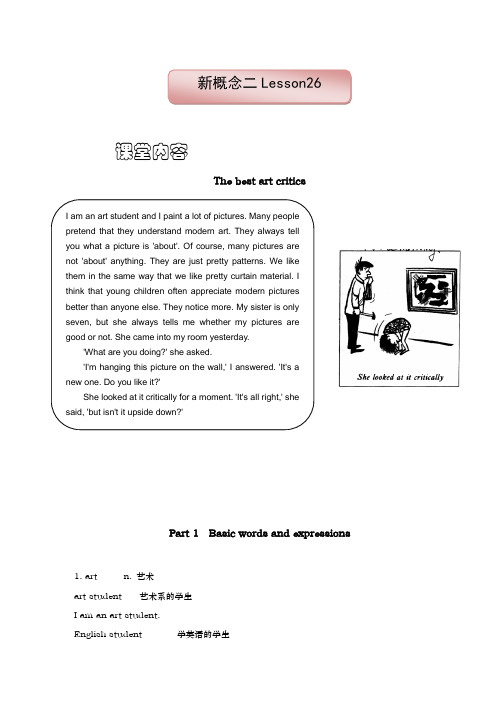
新概念二Lesson26课堂内容The best art criticsI am an art student and I paint a lot of pictures. Many peoplepretend that they understand modern art. They always tellyou what a picture is 'about'. Of course, many pictures arenot 'about' anything. They are just pretty patterns. We likethem in the same way that we like pretty curtain material. Ithink that young children often appreciate modern picturesbetter than anyone else. They notice more. My sister is onlyseven, but she always tells me whether my pictures aregood or not. She came into my room yesterday.'What are you doing?' she asked.'I'm hanging this picture on the wall,' I answered. 'It's anew one. Do you like it?'She looked at it critically for a moment. 'It's all right,' shesaid, 'but isn't it upside down?'Part 1 Basic words and expressions1. art n. 艺术art student 艺术系的学生I am an art student.English student 学英语的学生student of England 英国学生art gallery 艺术画廊(gallery n. 长廊, 游廊;画廊)black art 巫术【词汇相关】artist n. 艺术家artiste n. 艺人2. critic n. 评论家【词汇相关】criticize v. 批评, 批判(主要指批判, 但不完全是责备的意思) He criticized my painting.criticism n. 批评, 批判critical adj. 挑剔的You are critical.critically adv. 爱挑剔的3. paint v. 画draw a picture 用线条画paint a picture 强调油画painting n. 画oil painting 油画;Chinese painting 中国国画Beijing opera 国戏, 京剧4. pretend v. 假装pretend to do sth. 假装…When his mother came in,the baby pretended to go to sleep.pretend that +从句假装…5. pattern n. 图案① n. 图案pattern drills② n. 模式, 典X6. material n. 材料listening material 听力材料7. appreciate v. 鉴赏=understand and enjoyappreciate sth. 感激……I appreciate your help. 我很感激你的帮助appreciate doing sth. 我很喜欢做某事【词汇拓展】enjoy v. 欣赏,得到享受,乐趣I like…I love…I enjoy…I appreciate…(程度一个比一个深)I like sth.I like sth. very much.I like sth. better.I like sth. best.8. notice v. 注意到① vt. 注意到,察觉到(不用进行时)Y ou never notice what’s going on around you.notice 细节上的注意, 往往是别人没注意的东西, 你注意到了, 细节上的东西I notice the beauty spot.(美人痣)pay attention to 思想上的注意② n. 注意,察觉The girl in red caught his notice.③ n.(书面的)通知,布告,海报I know there’s a meeting, because someone p ut up a notice outside the Town Hall.9. whether conj. 是否if在表示“是否”的时候可以被whether所取代;if在表示“如果”的时候不可以用whether取代whether…or not =ifIf it will rain… (不是条件状语从句, 故可以用将来时will)=Whether it will rain…/Whether it will rain or not…(可以加“not” )I wondered if it will rain.(不加“not” )10. hang v. 悬挂, 吊① vt.&vi(将……)悬挂,吊A pretty curtain hangs over the window.hang — hung — hung v. 悬挂The coat was hung.hang — hanged — hanged v. 绞死, 吊死The thief was hanged.② vt.&vi 垂下John was very tired. He sat in a chair and hung (down) his head.③ vt.&vi安装……使能转动/摆动Have you hung the door? 你把门装上了吗?11. upside down 上下颠倒地① 上下颠倒When he stands on his head, everything appears upside down to him.② 乱七八糟,混乱不堪My little boy always makes the room upside down.These men have made the whole country upside down.Part 2 Passage Analyze1、They are just pretty patterns.just在此处指“只是,仅仅(是)”It was just a wrong number.just另一个意思是“刚才,正好,正是”It’s just six o’clock.I’ve just heard the news.2、We like them in the same way that we like pretty curtain material.pretty curtain material 漂亮的窗帘布in the same way that =as… 正如……一样The son walked in the same way that/as his father walked.I love you in the same way that I love my father.I love you just in the same way that I love money.in a way 以某种方式3、I think that young children often appreciate modern pictures better than anyone else.else跟在anyone,anything 等不定代词的后面,表示“另外/加、其它/他的、不同的”,else也可跟疑问代词连用,如who else,what elseI can find nothing else here except an old dictionary.They can appreciate modern arts best.better than anyone else 比其他任何人(表示最高级的含义)用比较级表示最高级:The teacher is the tallest.The teacher is taller than anyone else. (“else”不能少, 把主语从“anyone”中排除)The book is more expensive than anything else.4、My sister is only seven, but she always tells me whether my pictures are good or not.连接词whether…or not可以表示选择:I don’t know whether you are interested (in it) or not.You must help him, whether you like him or not.不管你是否喜欢他,你(都)必须帮助他。
宾语从句 (Object clause)
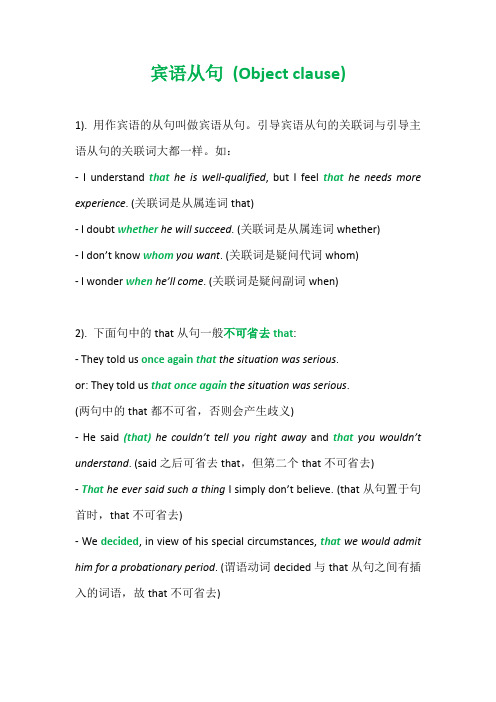
宾语从句(Object clause)1). 用作宾语的从句叫做宾语从句。
引导宾语从句的关联词与引导主语从句的关联词大都一样。
如:- I understand that he is well-qualified, but I feel that he needs more experience. (关联词是从属连词that)- I doubt whether he will succeed. (关联词是从属连词whether)- I don’t know whom you want. (关联词是疑问代词whom)- I wonder when he’ll come. (关联词是疑问副词when)2). 下面句中的that从句一般不可省去that:- They told us once again that the situation was serious.or: They told us that once again the situation was serious.(两句中的that都不可省,否则会产生歧义)- He said (that) he couldn’t tell you right away and that you wouldn’t understand. (said之后可省去that,但第二个that不可省去)- That he ever said such a thing I simply don’t believe. (that从句置于句首时,that不可省去)- We decided, in view of his special circumstances, that we would admit him for a probationary period. (谓语动词decided与that从句之间有插入的词语,故that不可省去)3). 下面句子中必须用whether,不可用if(是否):- Whether she likes the present is not clear to me. (主语从句置于句首时,须用whether,不用if,但可以说It is not clear to me if she likes the present.)- My main problem right now is whether I should ask for another loan. (引导表语从句一般应用whether,不用if)- Answer my question whether you are coming. (同位语从句须用whether,一般不用if)- He didn’t say whether or not he’ll be staying here. (whether可与or not 直接相连,if则不可,但可以说He didn’t say if he’ll be staying here or not.)4). 宾语从句也可用作介词的宾语。
初中英语人教版八年级下册The object clause (宾语从句)
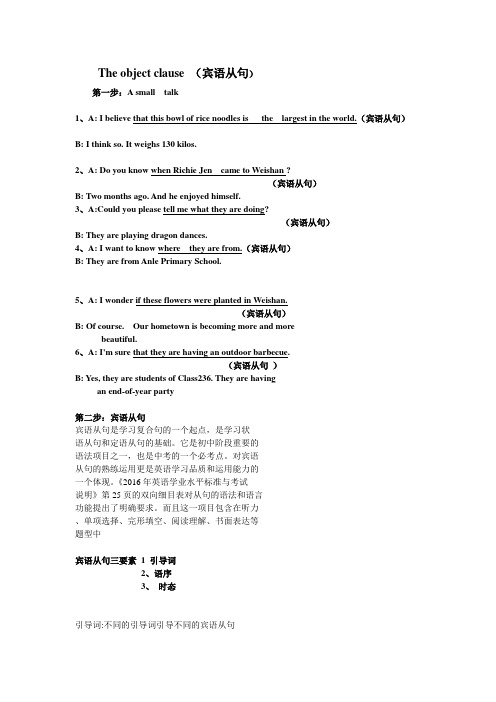
The object clause (宾语从句)第一步:A small talk1、A: I believe that this bowl of rice noodles is the largest in the world.(宾语从句)B: I think so. It weighs 130 kilos.2、A: Do you know when Richie Jen came to Weishan ?(宾语从句)B: Two months ago. And he enjoyed himself.3、A:Could you please tell me what they are doing?(宾语从句)B: They are playing dragon dances.4、A: I want to know where they are from.(宾语从句)B: They are from Anle Primary School.5、A: I wonder if these flowers were planted in Weishan.(宾语从句)B: Of course. Our hometown is becoming more and morebeautiful.6、A: I'm sure that they are having an outdoor barbecue.(宾语从句)B: Y es, they are students of Class236. They are havingan end-of-year party第二步:宾语从句宾语从句是学习复合句的一个起点,是学习状语从句和定语从句的基础。
它是初中阶段重要的语法项目之一,也是中考的一个必考点。
对宾语从句的熟练运用更是英语学习品质和运用能力的一个体现。
《2016年英语学业水平标准与考试说明》第25页的双向细目表对从句的语法和语言功能提出了明确要求。
新概念英语第三册:Lesson26重点句型解析
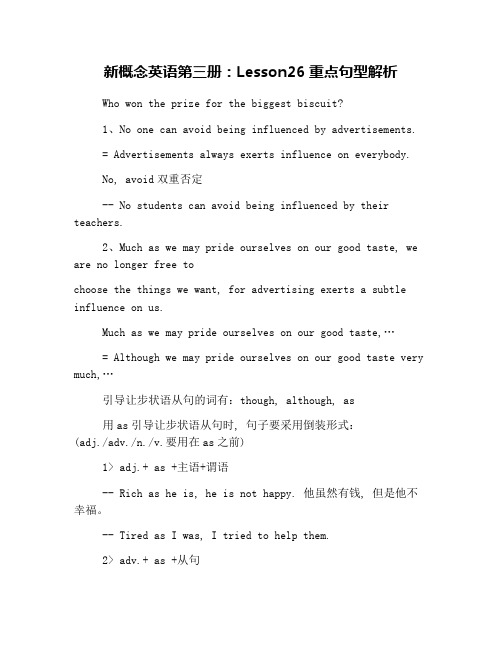
新概念英语第三册:Lesson26重点句型解析Who won the prize for the biggest biscuit?1、No one can avoid being influenced by advertisements.= Advertisements always exerts influence on everybody.No, avoid双重否定-- No students can avoid being influenced by their teachers.2、Much as we may pride ourselves on our good taste, we are no longer free tochoose the things we want, for advertising exerts a subtle influence on us.Much as we may pride ourselves o n our good taste,…= Although we may pride ourselves on our good taste very much,…引导让步状语从句的词有:though, although, as用as引导让步状语从句时, 句子要采用倒装形式:(adj./adv./n./v.要用在as之前)1> adj.+ as +主语+谓语-- Rich as he is, he is not happy. 他虽然有钱, 但是他不幸福。
-- Tired as I was, I tried to help them.2> adv.+ as +从句-- Much as I like you, I will not marry you.-- Much as I hate do it, I must stay home and study English.3> v.+ as +主语+阻动词-- Try as they may, they will never success.-- Object as my parents may, I decide to do it.采用不同的句子结构、不同的词汇表达同一个语义:3、No one can avoid being influenced by advertisements.= Advertising exerts a subtle influence on us.4、In their efforts to persuade us to buy this or that product, advertisers have made a close study of human nature and have classified all our littleweaknesses.Effort n.努力, 成就(需要耗费精神或体力的事情, 不可数名词)-- It took a lot of effort to lift the box.-- A great deal of effort has gone into this exhibition.Effort n.努力(可数名词)Make every effort-- We are making every effort to study English.In one’s effort to do 为了干好某事-- The company is selling off some of its buildings in their efforts to save money.-- sell off 廉价卖清-- In their effort to study English well, they spend a lot of time everyday.本句= Advertisers make every effort in order to sell their products.Close adj.谨慎的, 彻底的, 严格的Make a close(careful) study of… 对…做了仔细的研究5、Advertisers discovered years ago that all of us love to get something for nothing.Discover = find outGet something for nothing = get something free-- Free adj.adv.免费的6、An advertisement which begins with the magic word FREE can rarely go wrong.Wrong adv.错误, 不对-- You've spelt the word wrong. 你把这个单词拼错了。
object clause宾语从句
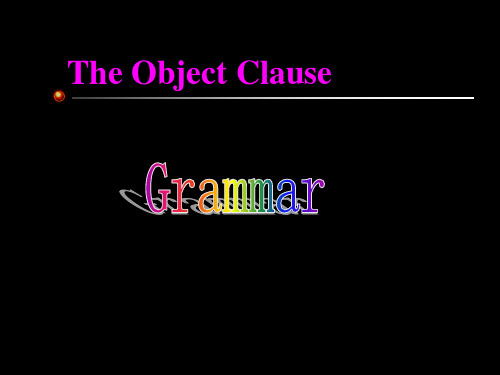
Lily wanted to know if /whether her grandma liked the handbag . Let’s see if /whether we can find out some information about that city . She asked me if /whether she could borrow these books .
一、选用适当的引导词填空 that; which, who, whom, when, where, how, why, whose; whether/if
1. Li Ping asked me _________ I didn’t come why to her birthday party yesterday. 2.The teacher asked Tom __________ he whom was waiting for. 3 .Her mother said _____________ she was that going to get a horse for her. 4. Do you know __________ this dictionary whose is ?
新概念英语第二册课件Lesson26(共23页)

1.在具有选择意义,尤其是直接与or not连用时,只用 whether。
• It was true whether you believe it or not.
2.在介词之后用whether。 • It depends on whether he is ready.
20223/8./16主语,表语,同位语从句中只用whether表“是否”.
• I like wuyanzu. I like liminhao better. I like Michael Jackson the best.
用比较级来表示 最高级的意思
I like Michael Jackson better than anyone else in the
showbiz .
The weather in Guangzhou is warmer than that in Beijing .
2.Beijing is larger than any city in China. (F)
Beijing is larger than any other city in China.
2022/8/16
notice
n. 通知,布告 put up a notice He came to me without notice.
v. 注意到,看到 1)notice sb doing sth 2) notice sb.do sth
I know you are looking at the bum, but did you notice the dog driving the car.
• C. They prerended to have been married.
新概念英语第四册第二十六单元语法和句型(教学用)
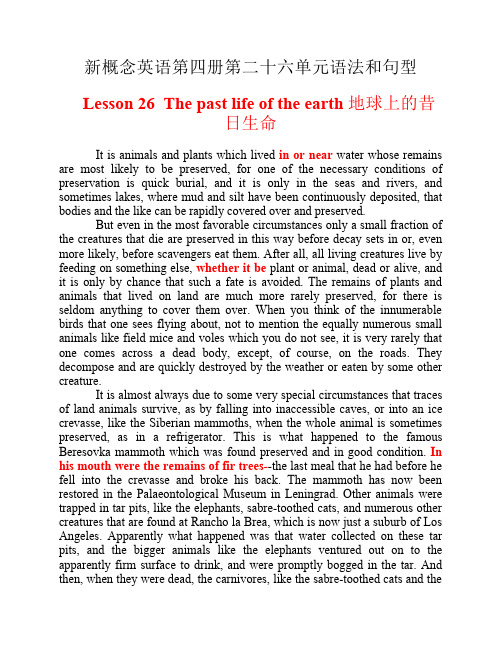
新概念英语第四册第二十六单元语法和句型Lesson 26 The past life of the earth 地球上的昔日生命It is animals and plants which lived in or near water whose remains are most likely to be preserved, for one of the necessary conditions of preservation is quick burial, and it is only in the seas and rivers, and sometimes lakes, where mud and silt have been continuously deposited, that bodies and the like can be rapidly covered over and preserved.But even in the most favorable circumstances only a small fraction of the creatures that die are preserved in this way before decay sets in or, even more likely, before scavengers eat them. After all, all living creatures live by feeding on something else, whether it be plant or animal, dead or alive, and it is only by chance that such a fate is avoided. The remains of plants and animals that lived on land are much more rarely preserved, for there is seldom anything to cover them over. When you think of the innumerable birds that one sees flying about, not to mention the equally numerous small animals like field mice and voles which you do not see, it is very rarely that one comes across a dead body, except, of course, on the roads. They decompose and are quickly destroyed by the weather or eaten by some other creature.It is almost always due to some very special circumstances that traces of land animals survive, as by falling into inaccessible caves, or into an ice crevasse, like the Siberian mammoths, when the whole animal is sometimes preserved, as in a refrigerator. This is what happened to the famous Beresovka mammoth which was found preserved and in good condition. In his mouth were the remains of fir trees--the last meal that he had before he fell into the crevasse and broke his back. The mammoth has now been restored in the Palaeontological Museum in Leningrad. Other animals were trapped in tar pits, like the elephants, sabre-toothed cats, and numerous other creatures that are found at Rancho la Brea, which is now just a suburb of Los Angeles. Apparently what happened was that water collected on these tar pits, and the bigger animals like the elephants ventured out on to the apparently firm surface to drink, and were promptly bogged in the tar. And then, when they were dead, the carnivores, like the sabre-toothed cats and thegiant wolves, came out to feed and suffered exactly the same fate. There are also endless numbers of birds in the tar as well. (NCE Book Four)【语法点】介词共用宾语【课文原句】It is animals and plants which lived in or near water whose remains are most likely to be preserved, for one of the necessary conditions of preservation is quick burial, and it is only in the seas and rivers, and sometimes lakes, where mud and silt have been continuously deposited, that bodies and the like can be rapidly covered over and preserved.【演练例句】发生在他身上和身边的事情一个物体在地球上的重量和在地球外的重量泵内外的压差往返伦敦的火车【语法点】让步状语从句中使用原形动词【课文原句】After all, all living creatures live by feeding on something else, whether it be plant or animal, dead or alive, and it is only by chance that such a fate is avoided.【演练例句】虚拟语气用在由“whether” 引导的让步状语从句中,从句谓语用原形动词。
宾语从句(Object Clause)
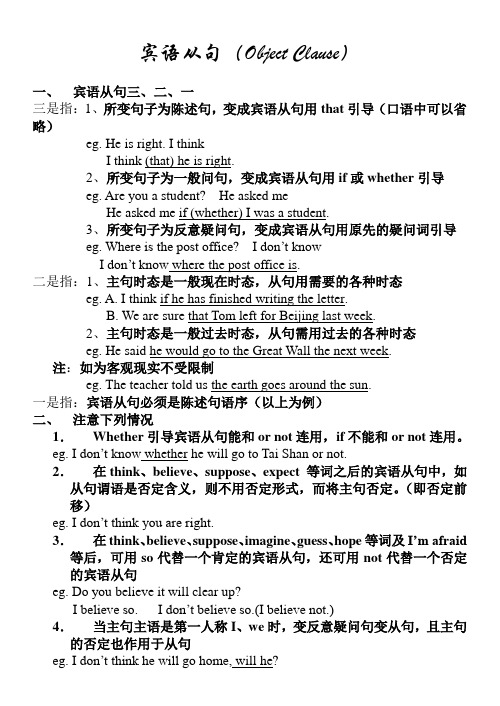
宾语从句(Object Clause)一、宾语从句三、二、一三是指:1、所变句子为陈述句,变成宾语从句用that引导(口语中可以省略)eg. He is right. I thinkI think (that) he is right.2、所变句子为一般问句,变成宾语从句用if或whether引导eg. Are you a student? He asked meHe asked me if (whether) I was a student.3、所变句子为反意疑问句,变成宾语从句用原先的疑问词引导eg. Where is the post office? I don’t knowI don’t know where the post office is.二是指:1、主句时态是一般现在时态,从句用需要的各种时态eg. A. I think if he has finished writing the letter.B. We are sure that Tom left for Beijing last week.2、主句时态是一般过去时态,从句需用过去的各种时态eg. He said he would go to the Great Wall the next week.注:如为客观现实不受限制eg. The teacher told us the earth goes around the sun.一是指:宾语从句必须是陈述句语序(以上为例)二、注意下列情况1.Whether引导宾语从句能和or not连用,if不能和or not连用。
eg. I don’t know whether he will go to Tai Shan or not.2.在think、believe、suppose、expect 等词之后的宾语从句中,如从句谓语是否定含义,则不用否定形式,而将主句否定。
(即否定前移)eg. I don’t think you are right.3.在think、believe、suppose、imagine、guess、hope等词及I’m afraid 等后,可用so代替一个肯定的宾语从句,还可用not代替一个否定的宾语从句eg. Do you believe it will clear up?I believe so. I don’t believe so.(I believe not.)4.当主句主语是第一人称I、we时,变反意疑问句变从句,且主句的否定也作用于从句eg. I don’t think he will go home, will he?5.直接变间接引语注意人称变化:eg. “Do you have breakfast?” I asked TomI asked Tom if he had breakfast.Exercises:Combine each pair of the sentences into a singleI.sentence, using an object clause:1.Our English teacher is quite young. (I hear)2.He can come back soon. (He said)3.Paul will finish his composition tomorrow. (I think)\4.Who is she talking with? (I didn’t know)5.Which city is Mary going to? (Mike asked me)6.What is he looking for? (I am not sure)7.“Do you go to school by bike?” (Father asked me)8.Have Tom been to Beijing? (I want to know)9.Can you help me? (He said to Kate)10.A re we having an English class? (They asked)11.W hat’s the matter, Peter? She asked.12.W hat do they do with the old books? Can you tell me?13.. Where do they stop on the way? I asked.14.What will you speak at the meeting? Could you tell me?15.Do they like to make friends with us? He asked.16.“ I am doing my homework.” He said.17.“I will come back.” Tom said.18.“Is he doing his homework?” Jim asked.19.. “When will he come back?” Tom asked.20.“How can I get to the station?” Could you tell me?21.“Why is the train late?” Would you tell me?22.“Where is Tom?” They asked.II.Choose the correct answer:( ). 1. My mother told me when I was young the sun in the east.A. riseB. roseC. risesD. risen( ) 2. Our teacher wants to know we have passed the exam or not.A. ifB. whetherC. weatherD. that( ) 3.- –Do you think it’s going to rain at the weekend?--- .A. I don’t think itB. I think soC. I think not soD. I think not ( ) 4. I believe I pass the exam.A. X, will notB. don’t, willC. X, won’tD. X, X( ) 5. We don’t hope the Chinese football team is beat, ?A. do weB. is weC. is itD. isn’t it( ) 6. I want to know he will come, he comes ,I’ll go to meet him.A. if, whetherB. whether, whetherC. if , ifD. if, weather ( ) 7. The boy wants to know book is his.A. who’sB. thatC. whichD. whose( ) 8. Please ask her she will go with us.A. ofB. whatC. whichD. which( ) 9 We want to know __________ she will come back.A thatB whoC whenD where( )10 Could you tell us _____________ from?A where are youB where you areC where were youD where did you come( ) 11 They said they __________ Hong Kong the next week.A will goB would goC has goneD wasIII.Fill in the blanks with the proper forms of given verbs:1.I hope it (not rain).2.He asked where I (live).3.I know our teacher (write) this book in 1998.4.The teacher said if the sun (be ) bigger than the moon.5.Mike said he (go) to China the next year.6.My classmates told me I (choose) as the monitor already.7.Could you tell me if he _________(like) to visit Paris?8.He asked me if I ___________ (believe) in Mr Brown.9The radio says it _________ cloudy tomorrow. (be)10he headmaster hopes everything ______ well. (go)11Tom says that they ____________ (play) basketball at six o’clock yesterday evening.12I hear they __________ (return) it already.13He said that they _________ members of the Party since 1948. (be)14He asked what they __________ at eight last night. (do)15The teacher told his class that light _______ faster than sound. (travel) 16I think you __________ about the relay race now. (talk)17I didn’t know whom the letters _________ from. (be)18 I didn’t know what time he _______ the letter. (write)19 Miss Wang told me that the earth ______(move) round the earth.20 Could you tell me who _________ away the book already? (take)21 Ling Feng told me he _________ to several times. (be)22 Our teacher told us in class the sun _______ in the east. (rise)23 Can you tell me what they ______ yesterday? (do)。
Object Clause(初二宾语从句)----名师归纳
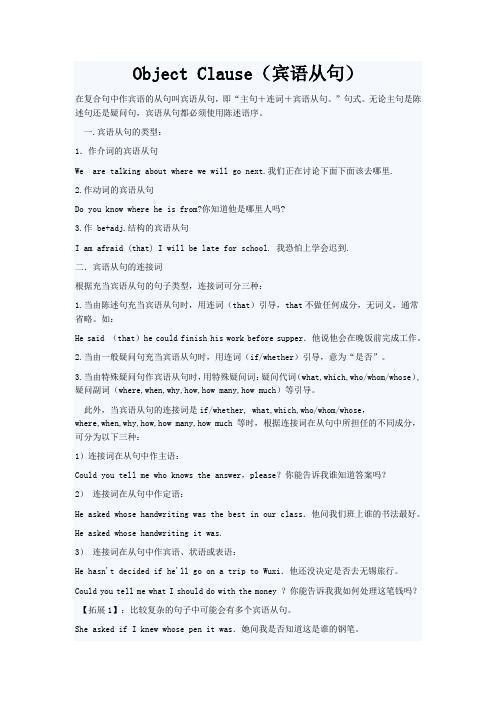
Object Clause(宾语从句)在复合句中作宾语的从句叫宾语从句,即“主句+连词+宾语从句。
”句式。
无论主句是陈述句还是疑问句,宾语从句都必须使用陈述语序。
一.宾语从句的类型:1.作介词的宾语从句We are talking about where we will go next.我们正在讨论下面下面该去哪里.2.作动词的宾语从句Do you know where he is from?你知道他是哪里人吗?3.作 be+adj.结构的宾语从句I am afraid (that) I will be late for school. 我恐怕上学会迟到.二.宾语从句的连接词根据充当宾语从句的句子类型,连接词可分三种:1.当由陈述句充当宾语从句时,用连词(that)引导,that不做任何成分,无词义,通常省略。
如:He said (that)he could finish his work before supper.他说他会在晚饭前完成工作。
2.当由一般疑问句充当宾语从句时,用连词(if/whether)引导,意为“是否”。
3.当由特殊疑问句作宾语从句时,用特殊疑问词:疑问代词(what,which,who/whom/whose),疑问副词(where,when,why,how,how many,how much)等引导。
此外,当宾语从句的连接词是if/whether, what,which,who/whom/whose,where,when,why,how,how many,how much 等时,根据连接词在从句中所担任的不同成分,可分为以下三种:1)连接词在从句中作主语:Could you tell me who knows the answer,please?你能告诉我谁知道答案吗?2)连接词在从句中作定语:He asked whose handwriting was the best in our class.他问我们班上谁的书法最好。
公开课件TheObjectClause(宾语从句)
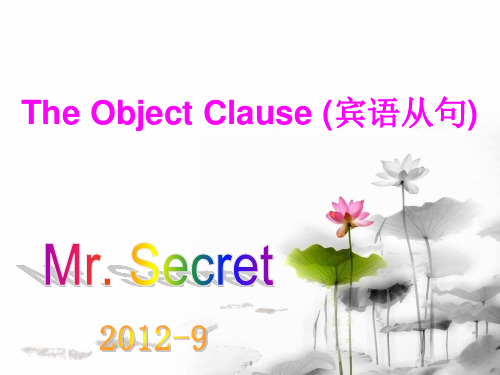
night before.
【梳理】
1.宾语从句的语序必须用_陈__述__句__(疑问句/ 陈述句)语序。
2. 宾语从句时态要随_主__句__的时态做适当的 变化。
主句宾语从句现在时一般现在时现在完成时可用所需的时态过去时要用表示的某一时态现在时过去时客观事实真理时用任何过去陈述句主句一般现在时梳理3
The Object Clause (宾语从句)
Learning focus: (学习目标)
1. 学会用疑问词引导宾语从句的用法。
2. 学会用形容词+that 引导的宾语从句 来描述自己的所知所感。
Guess she gave you things, I didn't give to you. I hate to turn up out of the blue uninvited. But I couldn't stay away, I couldn't fight it.
I'd hoped you'd see my __f_a_c_e___ & that you'd be reminded,
3. 掌握宾语从句的三要素:引导词、语序 和时态。
I heard that you settled down.
That you found a ____g_ir_l___ and you’re married now. I heard that your ___d_r_e_a_m__s__ came true.
I don’t know _w__h_a_t_ __t_o__ _d_o__.
ObjectClause宾语从句汇总
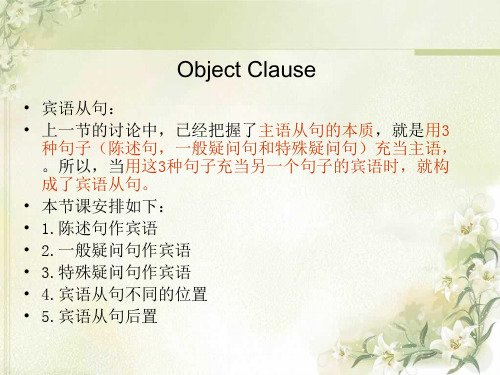
• 宾语从句: • 上一节的讨论中,已经把握了主语从句的本质,就是用3 种句子(陈述句,一般疑问句和特殊疑问句)充当主语, 。所以,当用这3种句子充当另一个句子的宾语时,就构 成了宾语从句。 • 本节课安排如下: • 1.陈述句作宾语 • 2.一般疑问句作宾语 • 3.特殊疑问句作宾语 • 4.宾语从句不同的位置 • 5.宾语从句后置
Object Clause
• 宾语
• 1.No one knows exactly the life on other planets. 简单句 • 2.No one knows exactly whether there is life on other planets. 宾语从句
• 一)陈述句,在句首+that
• 他在《华尔街日报》的一个专栏中写道:“对任何民主社会的检验 不在于他能多有效地控制言论自由的表达,而在于它是否能最大限 度地赋予思想自由和表达自由,尽管其结果有时可能会非常有争议 和令人不悦。面对威胁,我们不会退缩。
宾语从句后置
• 宾语从句若出现在宾补的结构中,此时宾语从句就应被置于补语 后面,是一个后置的宾语从句。 • 动词+ it(形式宾语) + 补语 + that 宾语从句 • We believe it true that the human body is also a kind of good conductor. • 人体也是一种良导体,我们认为这是对的。
Object Clause
• if 还是 whether? • 一,if一般只用于引导宾语从句,而whether 可引导所有的名词 从句 • 1.If he comes or not makes no difference. × • Whether he comes or not makes no difference. √ • 2.The question is if he will come. × • The question is whether he will come. √ • 二,if不和or not 直接连用,而是whether or not • 1. I don't know if or not he comes. × • I don't know whether or not he comes. √
初中语法宾语从句讲解与练习Object Clauses

宾语从句Object Clauses翻译:他告诉我们,他想呆在家里。
我听说他一个小时之后会回来。
2.由特殊疑问词who, whom, whose, which, what, where, how, why, when引导的宾语从句,这些词既有词义又在宾语从句中充当成分。
e.g.1)Do you know whose book it is ?2)Could you tell me why the train is late?3)He asked who could answer the question.(2011成都)——Can you tell me ______________ ? He’s a bank clerk.A.Who your father isB.What your father doesC.Where your father works(2012乌鲁木齐)I really don’t know______________?A.What should I doB. why he is so nervousC. How did he run awayD. where has he gone3.由从属连词whether, if 引导的宾语从句if/whether 引导宾语从句表示“是否”之义,说明对陈述的事物不明确或不清楚,在句中不充当句子成份. 常用在ask, wonder, can/could you tell me后(2012山东澭坊)We’ve given her some advice, but I don’t know _______ she’ll accept it.A.WhatB. whereC. whetherD. which 特殊情况:只能用whether不能用if的情况1.在介词后面:I’m thinking of whether we should go fishing.We didn’t think about whether it would rain the next day.2.在动词不定式前:They asked me whether to sit at the front.3.当与or not连用,或提出两种选择时:I don’t know whether he’s free or not.Mary asked whether I was doing my homework or not.Tell me whether you’d like to go shopping or tidy th e room.三. 宾语从句的语序无论主句是陈述句还是疑问句,宾语从句都是运用陈述句的语序,即是“主语在前,谓语在后”的顺序。
the object clause 宾语从句讲解
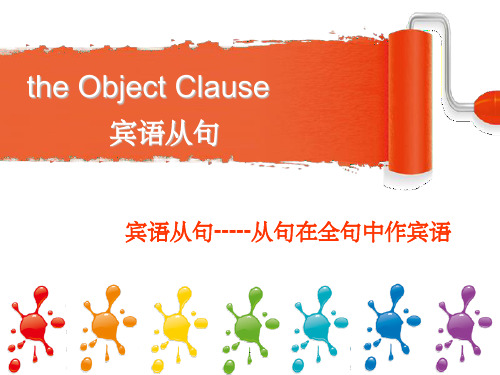
现在进行时 现在完成时
.
过去进行时 过去完成时
1.Did you understand___?
A.what she said
B.what to say
C.what did she said
D.how she had said
2.The girl is thinking about ___she will go abroad to
.
选择正确的选项
1. A: Could you tell me ? B: Yes , I'll show you .
A. what should I do with the computer
B. how can I use the computer C. how to use the computer
语序 宾语从句的语序为陈述句语序。
.
1.that引导的宾语从句. (that无词义,非正式文体可省) I think (that) I can sell newspapers. I don’t think you are right.
2. Whether/if引导的宾语从句. 译为“是否” Could you tell me if(whether) he can come? 当句末出现“or not" 时, 只能用 whether I don’t know whether it is going to rain or not 前面有介词时只用whether. We are talking about whether we should admit students watching TV.
D. what I how to use the computer
object clause 宾语从句
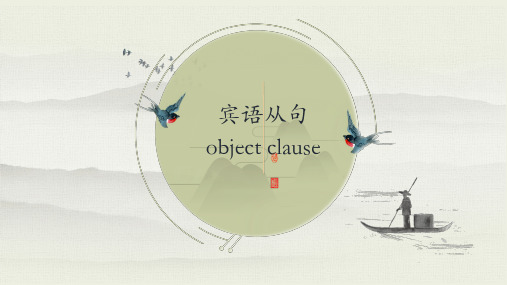
solve
• solve a puzzle 解谜 • solve a case 解决案件
• solution
progress
• make progress 取得进步 • the country has made significant economic progress。 • 该国经济取得了巨大进步 • achieve progress 取得进步
• 2.从句为一般疑问句,常选择连接词if或whether。在whether…or not 结构中不能用if替换。
• 3.从句为特殊疑问句,常选择what,when,where,which,who,how等的疑 问代、副词作连接词。
• 注意:当who为主语时,句式为:who+谓语+其他
• 三:判断时态情况:
时态
• 宾语从句的时态和语序当主句为现在时或将来时的时候,宾语从句的时态 一般不受主句的时态所影响.当主句为过去时的时候
• ①从句用一般过去时或过去进行时表示与主句谓语动词动作同时发生
The Object Clause 宾语从句
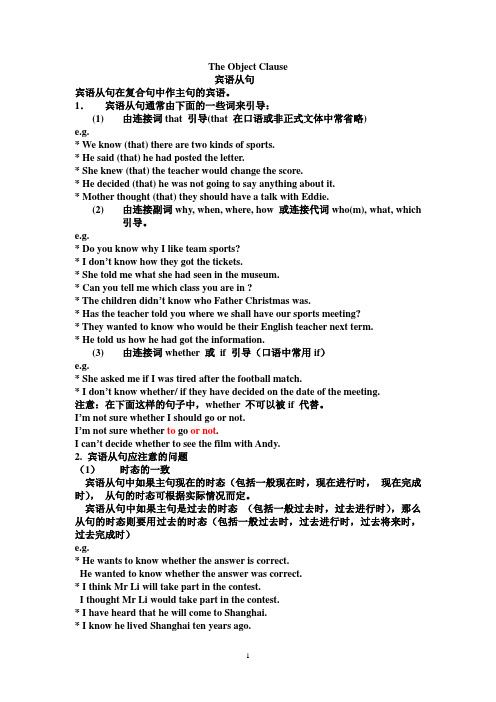
The Object Clause宾语从句宾语从句在复合句中作主句的宾语。
1.宾语从句通常由下面的一些词来引导:(1)由连接词that 引导(that 在口语或非正式文体中常省略)e.g.* We know (that) there are two kinds of sports.* He said (that) he had posted the letter.* She knew (that) the teacher would change the score.* He decided (that) he was not going to say anything about it.* Mother thought (that) they should have a talk with Eddie.(2)由连接副词why, when, where, how 或连接代词who(m), what, which引导。
e.g.* Do you know why I like team sports?* I don’t know how they got the tickets.* She told me what she had seen in the museum.* Can you tell me which class you are in ?* The children didn’t know who Father Christmas was.* Has the teacher told you where we shall have our sports meeting?* They wanted to know who would be their English teacher next term.* He told us how he had got the information.(3)由连接词whether 或if 引导(口语中常用if)e.g.* She asked me if I was tired after the football match.* I don’t know whether/ if they have decided on the date of the meeting.注意:在下面这样的句子中,whether 不可以被if 代替。
- 1、下载文档前请自行甄别文档内容的完整性,平台不提供额外的编辑、内容补充、找答案等附加服务。
- 2、"仅部分预览"的文档,不可在线预览部分如存在完整性等问题,可反馈申请退款(可完整预览的文档不适用该条件!)。
- 3、如文档侵犯您的权益,请联系客服反馈,我们会尽快为您处理(人工客服工作时间:9:00-18:30)。
Object clause
主语动词宾语(a)I know his address.
(noun phrase) 动词后面常常跟宾语,宾语通常为名词短语。
在(a)中:his address是名词短语,作动词know的宾语。
主语动词宾语(b)I know where he lives.
(noun clause)动词后面可以跟名词性从句*。
在(b)中:where he lives是名词从句,作动词know的宾语。
Read the sentences below.
♦ I think that Mr. Jones is a good teacher.
♦ Mary realizes that she should study harder.
♦I don’t know if/whether Eric is at home.
♦ I wonder if/whether Alice went to Chicago.
♦ Tell me who that boy is.
♦ Tell me what happened.
♦ I wonder why Tom is absent.
♦ Please tell me what she said.
Complete the table about object clause
三种情况连接词请用画出谓语动词,用____画出宾语从句陈述句
作宾语从句
that (可省略)Many people pretend that they understand modern art.
一般疑问句作宾语从句__________/if She always tells me whether my pictures are good nor
not.
____________作宾语从句what/why/how/where
/when/which…
They always tell you what a picture is ‘about’.
Exercise 1 Add the word that in the appropriate place to mark the beginning of a object clause.
1. I think that most people have kind hearts.
2. Last night I dreamed I was at my aunt's house.
3. I believe we need to protect endangered species of animals.
4. I know Matt walks to school every day.I assume he doesn't have a bicycle.
5. Did you notice Ji Ming wasn't in class yesterday? I hope he's okay.
6. I trust Linda. I believe what she said. I believe she told the truth.
Exercise 2 Change the yes/no question to an object clause.
1)Yes/No question: Is Susan here today?
Object clause: Can you tell me if(whether) Susan is here today ?
2)Yes/No question: Will Peter be at the meeting?
Object clause: Do you know _____________________________________?
3)Yes/No question: Did David go to work yesterday?
Object clause: I don’t remember____________________________________.
4)Yes/No question: Is Shanghai a coastal(沿海的) city?
Object clause: I wonder __________________________________________.
5)Yes/No question: Do you still have Jenny’s address?
Object clause: I don’t know ______________________________________.
Exercise3 Choose an appropriate sentence ending and chose a wh-word to connect them.
1)Before the meeting finished they arranged a …why Helen wasn’t with him.
2)He took my hands and showd b …what they had to do in the test.
3)I explained carefully so that the students know c. …where to put their coats.
4)When I saw Steve alone at the party I wondered d.…when to meet next.
5)As the guests came in Peter told e…how to hold the golf club(木棍) properly. Activity:
Dynamic: Pairs
Time: 10 minutes
Procedure:
1. Put the students in pairs. Give each a copy of the worksheet containing the six sentence fragments that they **plete with a noun clause. Encourage them to use the names of students form the class in **pletions and bo be silly if they want. You may also suggest a topic for the sentences.
SUGGESTIONS: your classmates
elephants
outer space
another country
the opposite sex
unusual animals
2. Go around the class and have the pairs read their **pletions. You may also want to see if any of the students can respond to a completed sentence. For example, if one pair writes"I wonder why Marissa was absent today," you may ask if anyone knows why.
I wonder…
Can you tell me…
Please tell me…
Do you know…
I don’t know…
I’d like to know…
I wonder…
Can you tell me…
Please tell me…
Do you know…
I don’t know…。
